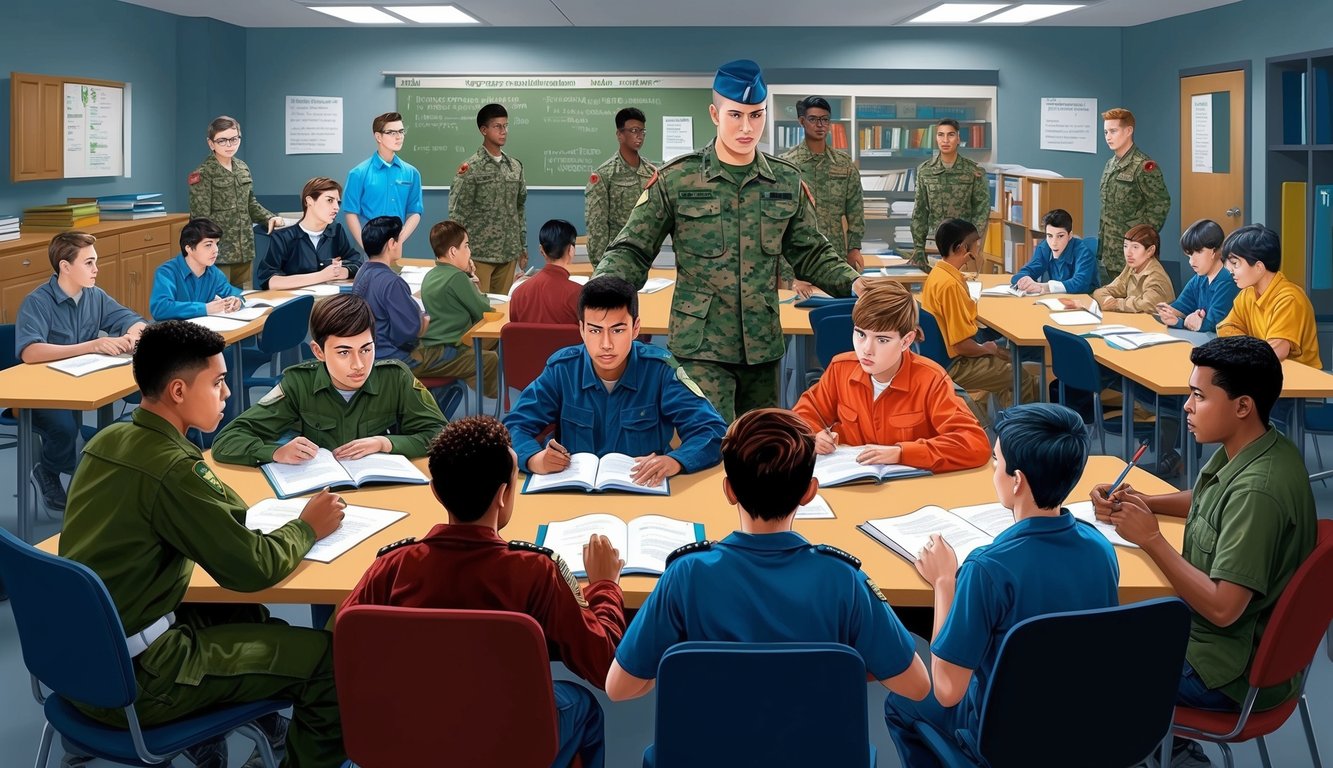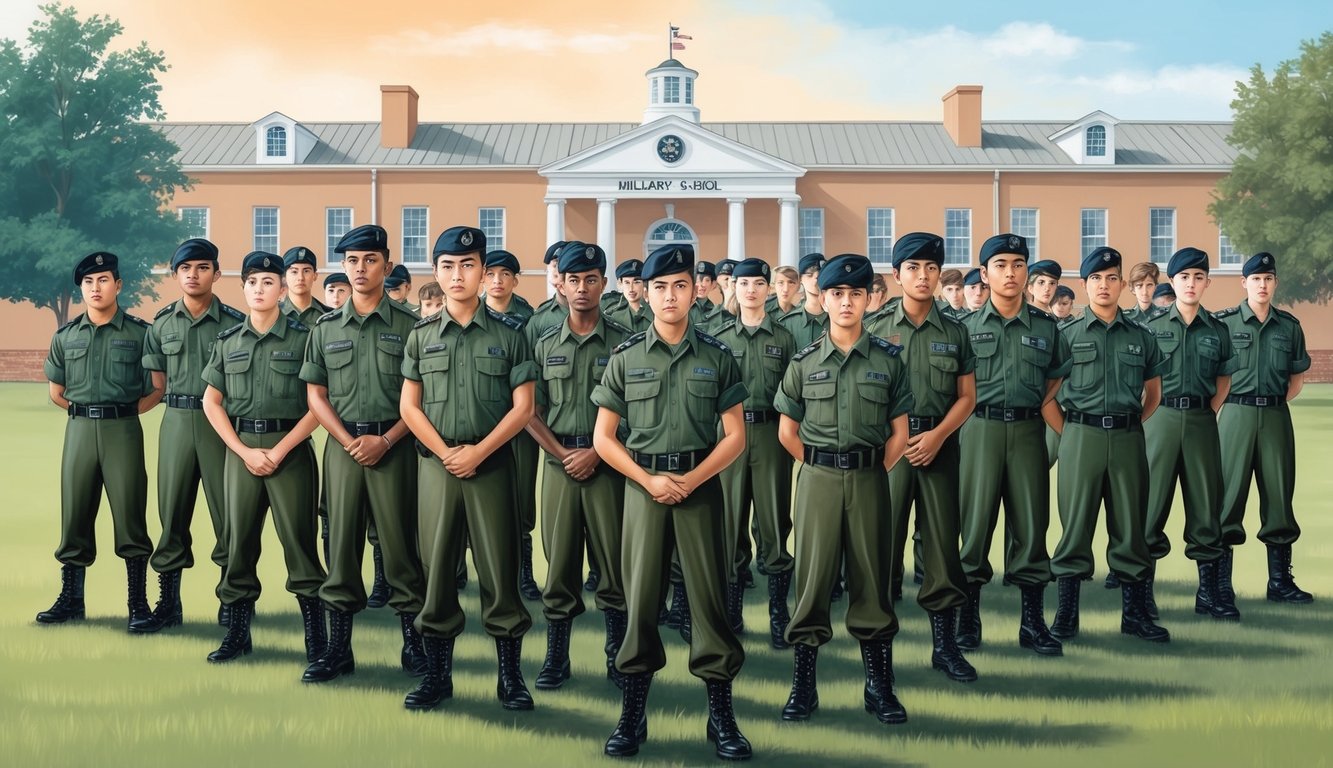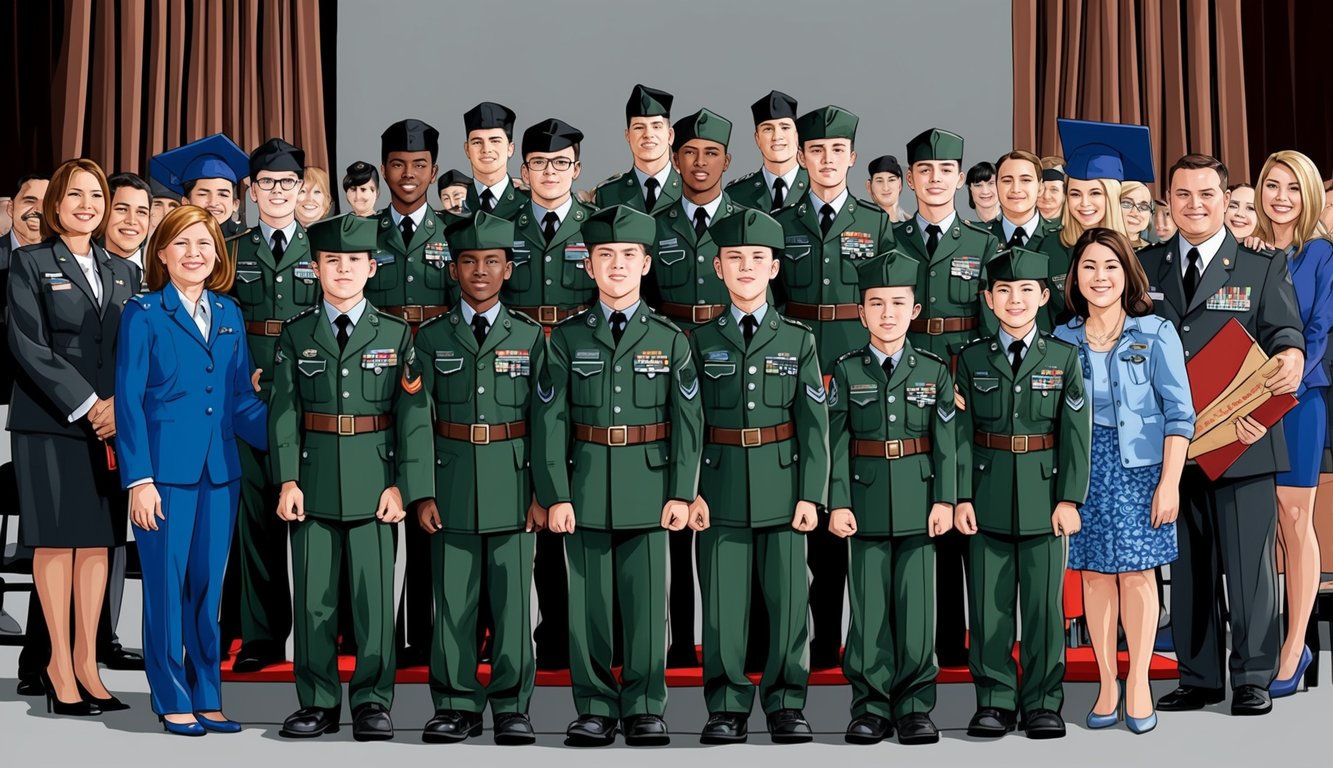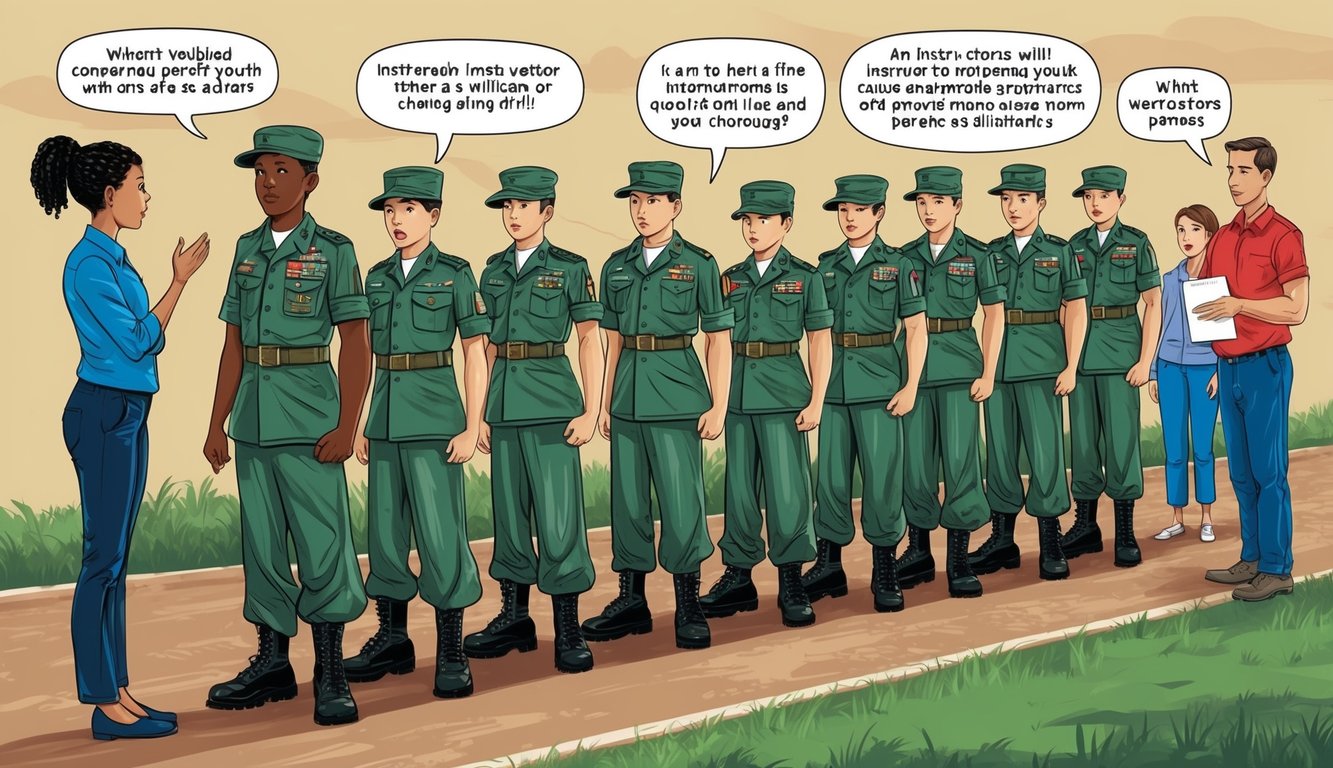Military schools provide an exceptional blend of discipline, structure, and educational opportunities for at-risk youth.
These institutions create an environment conducive to personal growth and overcoming obstacles. **Numerous free military schools throughout the United States present teens with the chance to reshape their lives without incurring tuition fees.**
Programs such as the National Guard Youth ChalleNGe Academy and state-specific initiatives like the Texas ChalleNGe Academy offer tuition-free alternatives for teenagers aged 16-18 dealing with difficulties in traditional educational settings.
These residential programs blend academic learning with [military-style discipline](https://sucharmy.com/best-military-workout-guides-and-programs/), equipping students with personal accountability and leadership skills.
If you are exploring military education options for a troubled teenager, you will discover schools that emphasize character development, academic success, and [physical fitness](https://sucharmy.com/best-guides-to-military-fitness-programs/).
Many of these institutions allow students to obtain their high school diploma or GED while acquiring essential life skills that can pave the way for success in higher education, the job market, or military service.
### Key Takeaways
– Free military schools provide structured settings that facilitate academic and personal achievement for troubled youth.
– Programs like the National Guard Youth ChalleNGe Academy offer tuition-free education for teens aged 16-18.
– Military schools prioritize discipline, education, and character development to prepare students for future success.
## Understanding Free Military Schools
Free military schools present distinctive educational paths for troubled youth, merging academic learning with military-style discipline and structure.
### Definition and Purpose
Free military schools are specialized educational institutions that create a disciplinary and structured atmosphere at no cost to families.
Their goal is to assist struggling teens in developing self-discipline, leadership abilities, and academic skills.
These institutions often operate as public charter schools or state-funded academies, primarily directing at-risk youth toward a more positive trajectory through demanding academics and character-building.
Many of these schools adopt a [military-inspired model](https://sucharmy.com/best-military-uniforms-and-camouflage-clothing/), incorporating uniforms, ranks, and physical training into their daily schedules.
### Benefits of Military Discipline and Structure
Military-style discipline can lead to transformative changes for troubled teens, fostering improvements in self-control, time management, and respect for authority.
The structured environment helps students:
– Build a robust work ethic.
– Acquire teamwork and leadership skills.
– Enhance physical fitness.
– Increase self-confidence.
Daily routines, including early wake-ups and scheduled activities, cultivate a sense of order and responsibility, often resulting in improved academic performance and personal development.
Students also learn valuable life skills like problem-solving and conflict resolution through various challenges and team exercises.
### Eligibility and Admissions Criteria
To enroll in a free military school, applicants typically should meet the following criteria:
– Age: Generally between 16-18 years old.
– Academic standing: Frequently behind in credits or at risk of dropping out.
– Legal background: No severe criminal history.
– Health: Physically and mentally fit for the program.
The application process may include:
1.
Completing necessary paperwork.
2.
Attending an open house or orientation.
3.
Showing motivation to participate.
4.
Submitting school records and medical history.
Some programs may require candidates to demonstrate their desire for change expressively, such as through essays or interviews.
## Key Features of Military Schools
Military schools present a unique educational environment aimed at promoting discipline, leadership, and academic excellence, merging rigorous academics with military training to produce well-rounded individuals.
### Daily Life and Routine
A typical day at military school starts early.
Students rise at dawn, make their beds meticulously, and participate in morning physical training.
Uniformed and prepared, they attend flag-raising ceremonies before their classes.
Meals in the mess hall are structured, teaching students proper etiquette while balancing academics, physical training, and extracurricular activities.
Evening study halls ensure students keep up with their assignments, and strict lights-out policies instill the importance of a consistent sleep schedule.
### Academic Curriculum and Training Programs
Military schools pride themselves on their academic rigor.
Students face challenging courses in mathematics, science, and humanities, often with advanced placement options to further their intellectual growth.
In addition to traditional subjects, students also engage in military science classes covering topics such as tactics, [military history](https://sucharmy.com/best-books-on-military-strategy-tactics-and-history/), and leadership theory.
Practical training programs complement theoretical learning, allowing students to practice navigation, first aid, or participate in simulated military scenarios.
Many schools provide specialized tracks, enabling students to focus on fields such as aviation, engineering, or cybersecurity, aimed at preparing them for future military or civilian careers.
### Leadership Opportunities
Leadership development remains a core focus of military education.
Students can regularly step up and lead their peers.
Cadet ranks reflect those of the military structure, allowing students to assume increasing responsibilities as they advance.
They may lead morning formations, mentor younger cadets, or organize school events.
Group projects and team-building exercises cultivate collaboration skills, teaching students to motivate peers, delegate effectively, and make decisive choices under pressure.
Summer leadership camps or JROTC programs are also available, offering intensive experiences that enhance leadership capabilities.
### Physical Fitness and Health
Physical fitness is a priority at military schools.
Daily training sessions enhance strength, endurance, and mental resilience.
Participation in team sports is often mandatory, promoting teamwork and sportsmanship.
Students may join competitive teams in various sports, such as football, basketball, or track and field.
Nutrition education is emphasized, imparting knowledge about proper fueling for optimal performance, both physically and mentally.
Regular health assessments and fitness evaluations maintain accountability toward personal fitness goals, with trainers available to support students in developing lifelong healthy habits.
## Nationwide Free Military School Options

Free military schools throughout the United States offer structured education and discipline for troubled youth.
These programs provide pathways for personal growth and academic success without the prohibitive costs commonly associated with private military academies.
### Military Schools by State and Region
The National Guard Youth Challenge Program operates free military-style academies in various states, including Alaska, Georgia, Illinois, and Texas.
Each academy generally follows a similar format but may feature unique local characteristics.
In Florida, the Sarasota Military Academy provides a tuition-free public charter school option, while the Delaware Military Academy offers no-cost naval science education.
Chicago’s Carver Military Academy and Virginia’s Franklin Military Academy serve as public high schools with military curricula.
Though not free, the New York Military Academy provides financial aid options.
Camden Military Academy in South Carolina and Riverside Military Academy in Georgia present scholarship opportunities for qualified students.
### Public vs.
Private Military Schools
Public military schools are typically free or low-cost, funded by state governments.
These include charter schools and magnet programs within public school systems.
Examples include the Chicago Military Academy and Texas military boarding schools.
Private military schools may charge tuition but often provide scholarships or financial assistance.
Institutions like the New Mexico Military Institute and Georgia Military Academy fall under this category.
While not free, many of them become more accessible through various financial aid programs.
When deciding between public and private options, consider factors like location, academic offerings, and extracurricular activities.
Generally, public schools have more open admissions policies, while private academies might be more selective but offer specialized programs.
## Scholarships and Financial Support

Various financial options are available to help make military school more affordable for troubled youth, ranging from merit-based scholarships to need-based grants and tuition assistance programs.
### Types of Scholarships Available
Military schools offer an array of scholarships to assist students.
Merit-based scholarships recognize outstanding academic performance, leadership potential, or athletic skill, while need-based scholarships support families facing financial challenges.
Some institutions provide legacy scholarships for the children of alumni or active-duty military personnel.
ROTC scholarships can cover educational costs in exchange for future military service.
Explore private organizations and foundations that offer scholarships specifically targeted at military school attendees, keeping in mind their unique eligibility criteria.
### Applying for Financial Aid and Assistance
Begin by completing the Free Application for Federal Student Aid (FAFSA) to determine eligibility for federal grants, work-study programs, and loans.
Contact the [financial aid](https://sucharmy.com/best-survival-kits-and-first-aid-kits/) offices at prospective military schools for guidance on school-specific applications and deadlines.
Investigate tuition assistance programs from various military branches available for dependents, which may significantly reduce tuition fees.
Also, consider local organizations, such as veterans’ groups or community foundations, that often provide grants or scholarships to support educational endeavors.
Make sure to apply early and meet all deadlines.
Gather necessary documents like tax returns and transcripts ahead of time to facilitate the application process.
## Additional Programs and Support
Free [military schools](https://sucharmy.com/best-military-survival-guides/) offer a variety of supplementary programs aimed at enhancing student development.
These initiatives focus on leadership, mentorship, and community engagement, ensuring a well-rounded experience.
### JROTC and Other Leadership Programs
The Junior Reserve Officers’ Training Corps (JROTC) is a prevalent program in many military schools, emphasizing leadership skills, discipline, and civic engagement.
Students learn about military history, physical fitness, and teamwork.
Many schools offer leadership academies or cadet programs that build confidence and decision-making skills through activities like ropes courses, team-building exercises, or public speaking workshops.
Leadership training is frequently integrated into everyday activities, allowing students to lead small groups, organize events, or manage projects.
### Mentorship and After-School Support
Mentorship is critical to student success in military schools.
Students are often paired with older peers or staff members who provide guidance.
After-school tutoring and study groups are standard, helping students stay on top of their studies and offering additional support when necessary.
Many schools provide counseling services to help address personal challenges, facilitating access to mental health resources and coping strategies.
Career guidance programs assist students in planning their futures, exploring various career paths, and preparing for college applications.
### Community Service and Involvement
Military schools typically emphasize community engagement.
Students may participate in local clean-up initiatives, volunteer at food banks, or assist elderly residents.
Schools often partner with local organizations for ongoing service projects, providing opportunities for students to mentor younger peers or assist with community events.
Leadership opportunities arise through community involvement, with students frequently organizing fundraisers or leading service teams.
Service learning credits may be awarded for combining academic concepts with community service, allowing students to apply classroom knowledge in real-world situations.
## Case Studies and Success Stories

Free military schools have remarkably transformed the lives of countless young people.
These programs offer the structure, discipline, and education required to help troubled youth regain control and realize their potential.
### Transformative Experiences of Former Students
At Oak Ridge Military Academy, stories abound of [remarkable change](https://sucharmy.com/best-biographies-of-military-leaders/).
One student, initially struggling with truancy and poor grades, transformed through the academy’s rigorous regimen, developing self-discipline and a newfound love for education.
He graduated with honors and later attended the Virginia Military Institute.
Similarly, Missouri Military Academy witnessed a young woman overcome behavioral challenges in a structured environment, fostering her self-esteem and leadership abilities.
Today, she excels in college and credits her success to the academy.
### Success Metrics and Long-Term Outcomes
Marine Military Academy showcases impressive success rates, with graduates typically continuing to college, many secured scholarships.
The focus on STEM education has propelled numerous students toward careers in engineering and technology.
Hargrave Military Academy also tracks alumni progress; five years following graduation, 85% of alumni report being either employed or pursuing higher education, attributing their success to the academy’s dedication to [character development](https://sucharmy.com/best-military-medals-and-ribbons/).
Phoenix STEM Military Academy has recorded a 40% increase in standardized test scores among its students, reinforcing the efficacy of military discipline combined with rigorous academics to enhance educational performance.
## Considerations for Parents and Guardians

Selecting a military school for your troubled teen necessitates thoughtful consideration and thorough research.
Various factors should guide your decision-making process to ensure the best fit for your child’s needs and your family’s objectives.
### Choosing the Right School
Look for schools with low student-to-teacher ratios, ensuring personalized support for your child.
Compare academic offerings and extracurricular activities, as some schools, like Admiral Farragut Academy, feature specialized programs tailored to specific needs.
Examine the school’s disciplinary approach.
Does it align with your values, as well as your child’s needs? Inquire about their success stories related to troubled teens and how they manage behavioral issues.
Affordability is critical; research financial aid options and scholarships.
Some schools might implement sliding scale tuition or work-study programs to help mitigate costs.
### Expectations vs.
Reality of Military School Life
Military schools are not boot camp experiences.
They prioritize education and personal development alongside strict routines.
Your teen will adhere to a structured schedule, wear uniforms, and partake in physical training.
Initial culture shock is common; your teenager may find early mornings, mandatory study hours, and restricted phone access challenging.
Personal care and hygiene become integral to their routine.
Expect academic demands to be high, requiring adaptation to rigorous coursework and regular assignments.
Many schools offer tutoring services to assist students as needed.
### Supporting Your Child Through Challenges
Maintaining regular contact with both your teen and school staff is essential.
Prepare for potential mood swings and feelings of homesickness, particularly in the initial months.
Encourage your child to embrace leadership and teamwork opportunities, as these skills hold significant value in military environments and can enhance self-esteem.
Ultimately, personal motivation is critical.
Change cannot be forced upon a teen; however, your support and encouragement can facilitate their growth.
Celebrate even minor achievements and improvements in behavior or academic performance.
If challenges arise, collaborate with the school to address them promptly.
Some teens may benefit from additional counseling or support services to thrive.
## Graduation and Beyond

Successfully completing a free military school program opens the door to numerous exciting opportunities.
Students emerge with [valuable skills](https://sucharmy.com/best-gps-devices-and-military-grade-navigation-tools/) and experiences that can propel them forward, whether in higher education or their careers.
### Transitioning from Military School to College or Career
Once students earn their high school diplomas, multiple paths forward become available.
Many graduates pursue college, leveraging the discipline and academic skills they developed.
Institutions like Georgia Military College provide excellent transitional programs from military high school to higher education.
Graduates may qualify for scholarships or financial assistance based on their performance.
Some opt to enlist in the military, applying their training immediately.
The National Guard Youth Challenge Academy serves as a valuable stepping stone for those pursuing military service.
Others may enter the workforce, often finding that employers appreciate the leadership and [teamwork skills](https://sucharmy.com/best-tactical-headsets-and-communication-devices/) acquired in military school.
Schools like Utah Military Academy frequently have career counselors available to assist with job searches.
### Alumni Programs and Continued Education
The connection to the school often continues beyond graduation.
Many free military schools maintain alumni networks and support initiatives that serve as invaluable resources for networking, job opportunities, and ongoing personal development.
Programs in states like Mississippi’s youth challenge initiatives offer continued mentorship.
Alumni might access career fairs, reunions, and professional development workshops.
Many schools also emphasize continued education, offering prospects for advanced training, certification courses, or college classes through partnerships.
Some alumni return as mentors or staff, contributing to the program that helped shape them.
Stay connected with peers and instructors; these relationships can provide lifelong support and camaraderie as alumni navigate their post-graduation journeys.
## Frequently Asked Questions

Families investigating military schools for troubled youth frequently have numerous questions regarding enrollment, available options, and associated costs.
Here are some common inquiries to assist in this important decision-making process.
### What process does one follow to enroll a young person in a military school in Texas?
Begin by researching military schools in Texas and contacting them to obtain application materials.
Typically, you must submit academic records, letters of recommendation, and medical forms.
If possible, schedule a [campus visit](https://sucharmy.com/best-military-tents-with-camouflage/) and interview.
Some schools may require entrance exams; be prepared to provide detailed information regarding your child’s background and any [behavioral issues](https://sucharmy.com/best-body-armor-and-protective-gear/).
### Are there age requirements for admitting a youth into Texas military schools?
Most Texas military schools accept students aged 12 to 18 years.
Some programs focus on specific age ranges, such as 14-17 or 16-18.
Verify exact requirements with individual schools.
Age limits may differ for day students compared to boarding students.
Certain schools offer [summer programs](https://sucharmy.com/best-military-tarps-and-ground-sheets/) with varying age criteria.
### What options are available for families seeking free military school education for their children?
Explore public military academies that function like charter schools and do not charge tuition.
The National Guard Youth Challenge Program offers complimentary quasi-military education in select states.
Some private military schools provide scholarships or financial aid.
Research state-specific programs that might offer funding for alternative educational paths.
### How does one find military schools for troubled youth in their local area?
Conduct an online search for “military schools for troubled youth” combined with your state or city.
Contact your state’s education department for listings of accredited programs.
Consult school counselors or juvenile justice professionals for recommendations.
Local military bases may also have information on nearby options.
### What are the expected costs associated with sending a youth to a military school?
Tuition at private military schools can range from $25,000 to $50,000 annually, including room and board for boarding students; day student fees usually are lower.
There may be additional costs for uniforms, textbooks, and activity fees.
Some schools charge extra for specialized programs or therapies.
### What are the alternatives to military school for managing troubled teens?
Therapeutic boarding schools focus on addressing emotional and behavioral issues, while wilderness therapy programs offer outdoor experiences combined with counseling.
Residential treatment centers provide intensive therapy for severe behavioral challenges, and day treatment programs allow teens to stay at home while receiving structured support.

